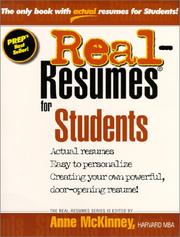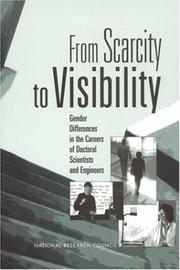| Listing 1 - 5 of 5 |
Sort by
|

ISBN: 1885288794 9781885288790 1885288182 9781885288189 Year: 2002 Publisher: Fayetteville : PREP Publishing,
Abstract | Keywords | Export | Availability | Bookmark
 Loading...
Loading...Choose an application
- Reference Manager
- EndNote
- RefWorks (Direct export to RefWorks)
Reviews and ExcerptsThe resumes of students are really different! Who else has job titles like Tutor, Camp Counselor, Lifeguard, Residence Hall Counselor, Intern, Student Teacher, Waitress, Sorority President, and Volunteer? How do you show clinical rotations and unpaid work experience on a resume? How can you use your achievements in high school to maximum advantage? How do you write an ""all-purpose"" resume and cover letter if you don't know what you want to do after graduation? The best way to ensure a distinguished career is to start out your career with the best ""first job"" after gradu

ISBN: 0309580285 9780309580281 9780309055802 0309055806 Year: 2001 Publisher: Washington, D.C. National Academy Press
Abstract | Keywords | Export | Availability | Bookmark
 Loading...
Loading...Choose an application
- Reference Manager
- EndNote
- RefWorks (Direct export to RefWorks)
College graduates -- Employment -- United States. --- Doctor of philosophy degree -- United States. --- Electronic books. -- local. --- Engineers -- United States. --- Scientists -- United States. --- Sex discrimination in employment -- United States. --- Women engineers -- United States. --- Women scientists -- United States. --- Physical Sciences & Mathematics --- Sciences - General
Book
ISBN: 1624172679 1624172687 9781624172687 9781624172670 Year: 2013 Publisher: Hauppauge, N.Y. : Nova Science Publishers, Inc.,
Abstract | Keywords | Export | Availability | Bookmark
 Loading...
Loading...Choose an application
- Reference Manager
- EndNote
- RefWorks (Direct export to RefWorks)
College graduates -- Employment -- Australia. --- Students, Foreign -- Employment -- Australia. --- College graduates --- Students, Foreign --- Business & Economics --- Labor & Workers' Economics --- Employment --- Foreign students --- International students --- Overseas students --- Students, International --- Graduates, College --- University graduates --- Visitors, Foreign --- Foreign students' spouses --- Foreign study --- Universities and colleges --- Alumni and alumnae --- E-books
Book
ISBN: 9460915701 9460915698 Year: 2011 Publisher: Rotterdam : SensePublishers : Imprint: SensePublishers,
Abstract | Keywords | Export | Availability | Bookmark
 Loading...
Loading...Choose an application
- Reference Manager
- EndNote
- RefWorks (Direct export to RefWorks)
A decade after the Bologna Declaration has called for the establishment of a cycle system of study programmes and degrees all over Europe the changes actually having occurred in this reform process can be measured and assessed. To what extent did the bachelor students gained international experiences during or after their study program? What is the proportion of bachelor degree holders who are employed about one year after graduation? What are the labor market experiences of those bachelor graduates who started to work? Was it difficult to gain relevant employment? What are the employment conditions for bachelor graduates in terms of income, position, working time, unlimited term contracts compared to traditional graduates? To what extent are bachelor graduates working in areas with close relation to their field of study (horizontal match)? Is their level of education needed for their work tasks (vertical match)? These are the key questions which will be answered in this volume based on surveys of graduates from institutions of higher education recently undertaken in ten European countries (Austria, Czech Republic, France, Germany, Hungary, Italy, Norway, Netherlands, Poland, and United Kingdom). The bachelor-master-structure actually implemented varies substantially between the countries and also the consequences of these reforms differ strikingly. In some countries, more students spend a period of study abroad than the goal set for the year 2020 in the Bologna Process; in other countries, not yet a quarter of the expected rate is achieved. Also the frequency of bachelor graduates differs by country who opt for further study, transfer to employment or are both employed and students. The comparative study also provides a wealth of information about the employment and work situation of bachelor graduates as compared to other graduates from institutions of higher education. The book provides relevant information for students and teaching staff at institutions of higher education, employers and politicians and administrative staff dealing with higher education issues.
Bologna process (European higher education). --- College graduates -- Employment -- Europe. --- Education and globalization -- Europe. --- Education --- Business & Economics --- Social Sciences --- Labor & Workers' Economics --- Theory & Practice of Education --- College graduates --- Bologna process (European higher education) --- Education and globalization --- Employment --- Globalization and education --- Bologna-Prozess --- Bolonskiĭ prot︠s︡ess --- Sorbonne-Bologna process --- Graduates, College --- University graduates --- Education. --- Higher education. --- Higher Education. --- Globalization --- Education, Higher --- Universities and colleges --- Alumni and alumnae --- Education, Higher. --- College students --- Higher education --- Postsecondary education
Book
ISBN: 9400713525 9400713533 Year: 2011 Publisher: Dordrecht : Springer Netherlands : Imprint: Springer,
Abstract | Keywords | Export | Availability | Bookmark
 Loading...
Loading...Choose an application
- Reference Manager
- EndNote
- RefWorks (Direct export to RefWorks)
This volume presents in detail the results, and policy implications, of a crucial project that aims to help shape the future for millions of Europeans. Higher education policy has increasingly gained a supranational dimension in Europe, with a federalist perspective boasting growing influence over national education policies. Given the vital links between the framework of higher education and the economy, this comes as no surprise in a Europe of coalescing financial interests. Against this background a large-scale research project was launched to assess the demands made by a modern ‘knowledge’ society on graduates of higher education. Called the REFLEX Project, it also aimed to establish the degree to which Europe’s higher education institutions are up to the task of equipping graduates with the skills to meet these demands. Rather than focus solely on tertiary education institutions, the REFLEX Project also sought to analyze how the requirements of the wider economy—as well as graduates’ ability to fulfil them—are in turn influenced by the way in which the process of work is organized in institutions of employment. It was a huge project undertaken across 16 nations, featuring a survey of Europe-wide proportions—with some 70,000 graduate respondees. In addition to setting out the findings of the survey, whose content constitutes the largest data set of any comparable undertaking, this in-depth report uses these results to infer vital matters of policy that will need to be assimilated by those individuals and social institutions which help fashion tomorrow’s education paradigm—including graduates and prospective undergraduates. Whether consulted as a source of raw data or read as an influential intervention in the debate over education, this report deserves the widest possible readership.
Career education. --- College graduates -- Employment. --- Education, Higher -- Aims and objectives. --- Education, Higher -- Europe. --- Universities and colleges. --- Vocational guidance. --- Education, Higher --- College graduates --- Core competencies --- Information society --- Business & Economics --- Education --- Social Sciences --- Labor & Workers' Economics --- Theory & Practice of Education --- History of Education --- Employment --- Educational surveys --- Research --- Aims and objectives --- College students --- Higher education --- School surveys --- Education. --- International education. --- Comparative education. --- Educational policy. --- ducation and state. --- Educational sociology. --- Higher education. --- Sociology. --- Education and sociology. --- Sociology, Educational. --- Higher Education. --- International and Comparative Education. --- Sociology of Education. --- Educational Policy and Politics. --- Sociology, general. --- Postsecondary education --- Universities and colleges --- Education and sociology --- Social problems in education --- Society and education --- Sociology, Educational --- Sociology --- Social theory --- Social sciences --- Education policy --- Educational policy --- State and education --- Social policy --- Endowment of research --- Education, Comparative --- Global education --- Intellectual cooperation --- Internationalism --- Children --- Education, Primitive --- Education of children --- Human resource development --- Instruction --- Pedagogy --- Schooling --- Students --- Youth --- Civilization --- Learning and scholarship --- Mental discipline --- Schools --- Teaching --- Training --- Government policy --- History --- Social surveys --- Education, Higher. --- International education . --- Education and state.
| Listing 1 - 5 of 5 |
Sort by
|

 Search
Search Feedback
Feedback About
About Help
Help News
News